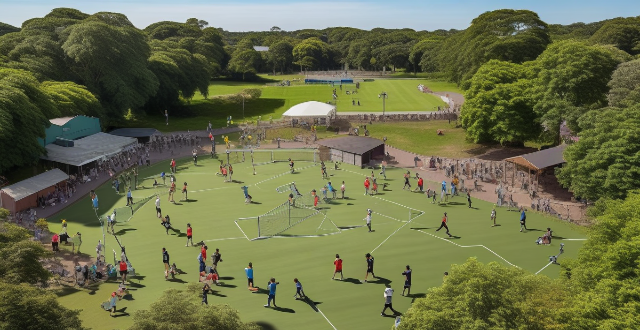The article discusses the impact of sports on social cohesion and community spirit in rural areas. Sports bring people together, promote teamwork, and create a sense of belonging that can strengthen the fabric of a community. The article explores how sports build social capital by forming friendships and encouraging civic engagement. It also highlights how sports promote teamwork and cooperation by teaching communication skills and collaboration towards a common goal. Finally, the article emphasizes how sports create a sense of belonging within a community by supporting local teams and participating in community events. Overall, sports have a significant impact on rural communities and contribute to their overall well-being.

Impact of Sports on Social Cohesion and Community Spirit in Rural Areas
Sports have a significant impact on social cohesion and community spirit in rural areas. They bring people together, promote teamwork, and create a sense of belonging that can strengthen the fabric of a community. In this article, we will explore the various ways in which sports can positively affect rural communities.
1. Building Social Capital
One of the most important ways in which sports can enhance social cohesion is by building social capital. Social capital refers to the networks, norms, and trust that exist within a community. When people participate in sports, they are more likely to form connections with others who share similar interests and values. These connections can lead to increased trust and cooperation, which are essential for strong community bonds.
1.1 Forming Friendships
Participating in sports provides opportunities for individuals to form friendships with others who share their passion for physical activity. These friendships can extend beyond the playing field, leading to lasting connections that contribute to a sense of belonging within the community.
1.2 Encouraging Civic Engagement
Sports also encourage civic engagement by promoting volunteerism and participation in local events. Many rural communities rely on volunteers to organize and run sporting events, providing residents with opportunities to contribute to their community in meaningful ways.
2. Promoting Teamwork and Cooperation
Another way in which sports can enhance social cohesion is by promoting teamwork and cooperation. When individuals work together towards a common goal, they learn valuable skills such as communication, collaboration, and problem-solving. These skills can be applied both on and off the playing field, contributing to stronger community bonds.
2.1 Learning Communication Skills
Participating in sports requires effective communication between teammates. This skill can be transferred to other areas of life, such as school or work, where clear communication is essential for success.
2.2 Collaborating Towards a Common Goal
Sports require individuals to work together towards a common goal, whether it's winning a game or improving their performance. This sense of shared purpose can foster a sense of unity within a community, as members come together to support one another in achieving their goals.
3. Creating a Sense of Belonging
Finally, sports can create a sense of belonging within a community by providing opportunities for individuals to feel like they are part of something larger than themselves. When people come together to cheer on their local team or participate in a community event, they develop a sense of pride and ownership over their community.
3.1 Supporting Local Teams
Supporting local teams is an excellent way to create a sense of belonging within a community. Residents can come together to cheer on their favorite players and show their support for their town or village.
3.2 Participating in Community Events
Participating in community events, such as charity walks or fun runs, also helps create a sense of belonging within a community. These events provide opportunities for residents to interact with one another outside of their daily routines, fostering connections that can lead to increased social cohesion.
In conclusion, sports have a significant impact on social cohesion and community spirit in rural areas. By building social capital, promoting teamwork and cooperation, and creating a sense of belonging, sports can help strengthen the fabric of rural communities and contribute to their overall well-being.